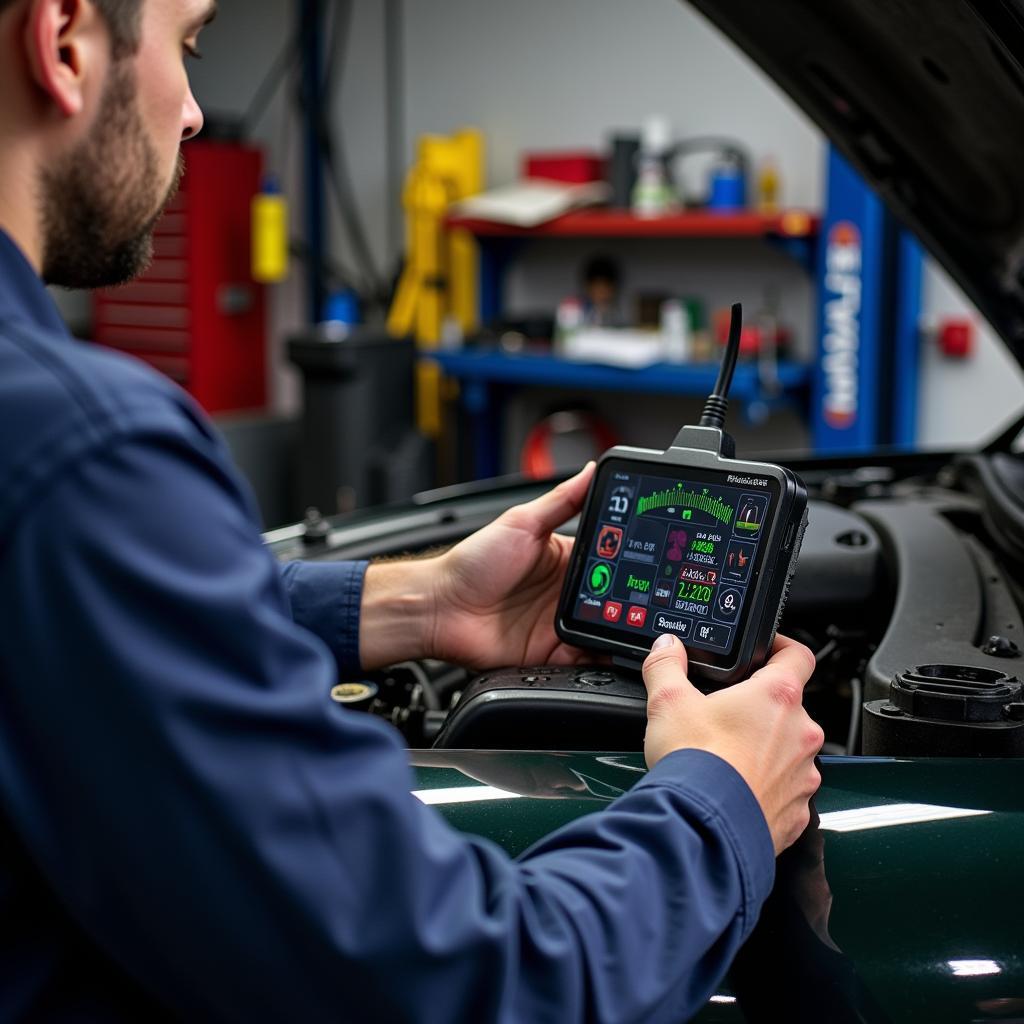Car engine diagnostic is crucial for maintaining your vehicle’s health and performance. Modern vehicles are complex machines, and diagnosing engine issues requires specialized tools and knowledge. Understanding the process, its benefits, and the available options can empower you to make informed decisions about your car’s care. A thorough car engine diagnostic can save you time and money in the long run. Let’s dive deeper into this essential aspect of car maintenance.
A car engine diagnostic involves using specialized tools and software to scan your vehicle’s computer system, identify stored trouble codes, and pinpoint the root cause of engine problems. This process goes beyond the check engine light, providing a comprehensive analysis of your engine’s performance. It assesses various components, including the ignition system, fuel system, emission system, and sensors, ensuring optimal functionality. car engine diagnostic scanner can help pinpoint problems accurately.
Why is Car Engine Diagnostic Important?
Regular car engine diagnostics play a vital role in preventative maintenance, enabling early detection of potential issues before they escalate into major repairs. This proactive approach can save you significant costs and headaches down the road. Early diagnosis also contributes to improved fuel efficiency, as it allows for timely adjustments and corrections to optimize engine performance. Additionally, a properly functioning engine reduces harmful emissions, contributing to a cleaner environment.
Benefits of Regular Car Engine Diagnostics
- Early Problem Detection: Catch issues before they become major repairs.
- Improved Fuel Efficiency: Optimize engine performance for better mileage.
- Reduced Emissions: Contribute to a cleaner environment.
- Enhanced Safety: Ensure your vehicle is running safely and reliably.
- Preventative Maintenance: Prolong the life of your engine.
- Cost Savings: Avoid expensive repairs by addressing problems early.
 Car Engine Diagnostic Process
Car Engine Diagnostic Process
Types of Car Engine Diagnostic Tools
From simple code readers to advanced professional scanners, there’s a wide range of car engine diagnostic tools available to suit different needs and budgets. Understanding the capabilities of each type can help you choose the right tool for your situation.
OBD-II Scanners
OBD-II scanners are essential for retrieving diagnostic trouble codes (DTCs) from your vehicle’s computer. They come in various forms, from basic handheld devices to sophisticated software programs. Choosing the correct car engine diagnostic meters is important for accurate readings.
Diagnostic Software
Advanced diagnostic software offers a deeper level of analysis, providing detailed information about the various systems in your vehicle. These programs often include features such as live data streaming, graphing capabilities, and access to technical service bulletins (TSBs).
Professional Scan Tools
Professional-grade scan tools offer the most comprehensive diagnostic capabilities, allowing mechanics to perform advanced tests and reprogramming procedures. These tools are typically used in repair shops and dealerships.
Understanding Diagnostic Trouble Codes (DTCs)
Diagnostic trouble codes (DTCs) are alphanumeric codes that represent specific malfunctions detected by the vehicle’s onboard diagnostic system. Each code corresponds to a particular problem, providing valuable clues for troubleshooting.
Interpreting DTCs
While DTCs provide important information, they are not a definitive diagnosis. They indicate the area of concern, but further investigation is often necessary to pinpoint the exact cause of the problem. You can benefit from free car engine diagnostics test to get started.
“Accurate interpretation of DTCs requires a combination of technical knowledge and practical experience,” says Michael Stevenson, a certified automotive technician with over 20 years of experience. “It’s important to consider the context of the code, along with other symptoms and data, to arrive at a correct diagnosis.”
Finding Car Engine Diagnostic Services
Locating reliable car engine diagnostic services is essential for proper vehicle maintenance. Various options are available, including repair shops, dealerships, and mobile mechanics. Consider factors such as experience, reputation, and cost when choosing a service provider. You can search for car engine diagnostics near me to find local services.
DIY Car Engine Diagnostics
With the availability of affordable diagnostic tools and online resources, some car owners opt for the DIY approach to engine diagnostics. While this can be a cost-effective option for minor issues, it’s essential to have a basic understanding of car mechanics and the diagnostic process.
When to Seek Professional Help
For complex engine problems or if you’re uncomfortable working on your car, it’s always best to seek professional help. A qualified mechanic has the expertise and equipment to diagnose and repair complex issues effectively. You might consider a car engine diagnostic dongle for more comprehensive DIY diagnostics.
Conclusion
Car engine diagnostic is a critical aspect of vehicle maintenance, enabling early problem detection, improved performance, and cost savings. By understanding the process, the available tools, and the importance of regular diagnostics, you can ensure your vehicle runs smoothly and reliably for years to come. Regular car engine diagnostic can help prevent costly repairs and maintain your vehicle’s optimal performance.
FAQs
- How often should I get a car engine diagnostic?
- What does the check engine light mean?
- Can I perform a car engine diagnostic myself?
- How much does a car engine diagnostic cost?
- What are the common causes of engine problems?
- What is an OBD-II port?
- How do I interpret diagnostic trouble codes?
Common Car Diagnostic Scenarios:
- Check Engine Light On: This is the most common scenario. The light could indicate anything from a loose gas cap to a serious engine problem.
- Rough Idle: A rough or shaky idle can be caused by various issues, including spark plug problems, vacuum leaks, or fuel system problems.
- Poor Fuel Economy: A sudden drop in fuel economy could indicate a problem with the fuel injectors, oxygen sensors, or other components.
- Misfires: Engine misfires can lead to reduced power, rough idling, and increased emissions.
- Loss of Power: A noticeable decrease in engine power can be caused by problems with the fuel system, ignition system, or other engine components.
Further Reading:
Check out our other articles on car maintenance and repair:
- Guide to Car Diagnostic Scanners
- Understanding OBD-II Codes
- DIY Car Repair Tips
Need help with your car engine diagnostic? Contact us via WhatsApp: +1(641)206-8880, or Email: [email protected]. Our 24/7 customer support team is ready to assist you.
